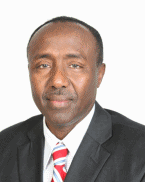|
Dualeh was always ready for call from Somaliland

Hussein Abdi Dualeh’s
determination and passion for the oil industry led to
homecoming as a government minister
LONDON — HUSSEIN Abdi Dualeh is Minister of Mining,
Energy & Water Resources for the brea kaway Republic of
Somaliland in the Horn of Africa, a territory exactly
the same as the form er British Protectorate of
Somaliland, but which remains unrecognised by the
international community.
Dualeh was born under a tree in the Saraar region of
central Somaliland, and was only five when his father
upped sticks and moved the family to Aden in what was
then South Yemen in the Arabian peninsula.
After returning for secondary education at the reputable
SOS Sheikh International School, D ualeh himself got
itchy feet and set off alone for Abu Dhabi, where he got
a job selling lubric ants and gasoline to bulk buyers
for the state-owned oil company Adnoc.
It was here that his passion for the oil business grew,
doing with a determination to prepare himself for a
serious role in the industry.
This idea drove him in 1979 to the University of
Oklahoma, where he completed a petroleum engineering
degree, with a view to building a career back in the
Middle East.
However, prompt job offers from several majors upon
graduation persuaded him to stay on in the US and he
ended up employed by Chevron in Los Angeles.
He pushed water out of old mature oilfields in
California and later moved to work offshore by the late
1980s.
“And all this time I was toiling pro bono for successive
governments back home, advising Ha rgeisa (the capital
of Somaliland) on oil and gas affairs, scrutinising
contracts and purchase agreements and encouraging
companies to invest in Somaliland.”
During that time, Dualeh was getting deeply involved in
the turbulent politics of his homelan d, a once free
state with a stable polity, which asserts sovereign
independence from the rump of the Transitional Federal
Government in Mogadishu.
He joined the opposition Kulmiye Party — Kulmiye means
the one who brings the people toge ther — and he rose to
become chairman of the party’s North American chapter,
catching the eye of the party’s leader, now President
Ahmed Mohamed Silanyo.
By this time in 1990 Dualeh had married and was holding
down a top downstream job as ope rations manager with
California’s Metropolitan Transport Authority, ensuring
compressed natural gas supplies for the fleets and
developing new business.
His Somali wife and three children were happy and
thriving in the golden state.
“Then while visiting Hargeisa in July 2010 I met Silanyo
face to face and he told me he had other plans for me
and that I should come home. I had always dreamed of
coming back to Somaliland and now, look, I’m sitting
here as minister.”
His children are in their midteens and visit Hargeisa
frequently.
“They’re proud of my decision to return and improve
conditions in the country. They encour age me and
they’re also longing to be part of the adventure… I must
say, their reaction was the turning point in my story.”
He is optimistic about his life and the future. “It’s
all about waking up in the morning and wan ting to make
things happen.”
He has little patience for majors claiming force majeure
and even less for briefcase outfits showing no obvious
commitment — he wants action.
“I’ve just been to China to discuss Hong Kong-based
PetroTrans installing a gas pipeline from Ethiopia to
our port at Berbera, along with liquefied natural gas
export trains, and I think it’s a very good idea.
“We have a peaceful country, an open door policy and
demand contract sanctity just as we offer contract
security.”
Commenting on overtures from New York-based financier
and equity venture company Jarch Capital, run by
Philippe Heilberg — the company specialising in energy
deals with non soverei gns, which won sweeping
exploration and production rights to the entirety of
nearby South Sudan — Dualeh says they are still knocking
on the door.
“Heilberg tried to do a deal but it didn’t go well. He
was offered a huge slice but wanted the whole country,
so we just parted ways without agreement.”
At the other end of the spectrum, Dualeh says “a lot of
oddball ‘Joe Blow’ companies pass through Hargeisa, but
I don’t pay them any attention — we’re looking for
serious technical and financial competence to get real
exploration restarted”
By Barry Morgan
|